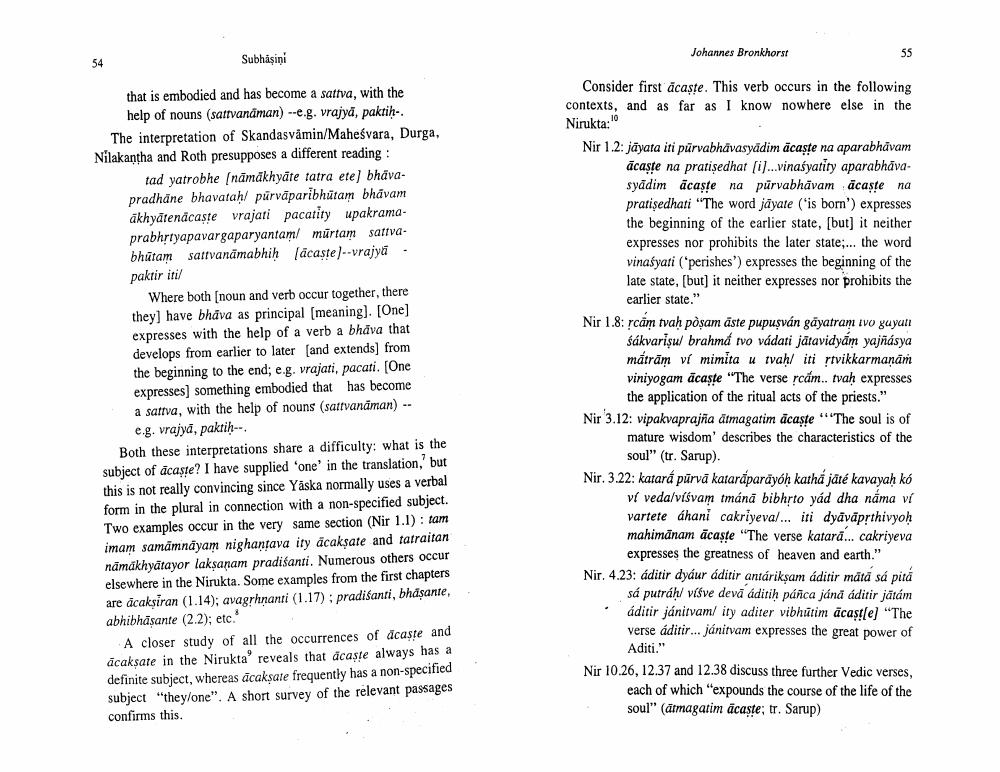Book Title: Yaska And Sentence Beginning Ofsabdabodha Author(s): Johannes Bronkhorst Publisher: Johannes Bronkhorst View full book textPage 6
________________ Johannes Bronkhorst 55 Subhaşini Consider first acaste. This verb occurs in the following contexts, and as far as I know nowhere else in the Nirukta: that is embodied and has become a sattva, with the help of nouns (sattvanaman) --e.g. vrajya, paktih.. The interpretation of Skandasvåmin/Maheśvara, Durga, Nilakantha and Roth presupposes a different reading : tad yatrobhe (nāmākhyāte tatra ete) bhävapradhane bhavatah/ pārvāparibhūtam bhāvam ākhyātenacaste vrajati pacatity upakramaprabhrtyapavargaparyantam/ murtam sativabhūtam sattvanāmabhih lacaste)--vrajya . pakrir iti Where both (noun and verb occur together, there they) have bhāva as principal (meaning). [One) expresses with the help of a verb a bhāva that develops from earlier to later and extends) from the beginning to the end; e.g. vrajati, pacati. (One expresses) something embodied that has become a sattva, with the help of nouns (sattvanaman) -- e.g. vrajya, paktihBoth these interpretations share a difficulty: what is the subject of acaste? I have supplied 'one' in the translation, but this is not really convincing since Yaska normally uses a verbal form in the plural in connection with a non-specified subject. Two examples occur in the very same section (Nir 1.1): tam imam samāmnayam nighantava ity acaksate and tatraitan nämäkhyātayor laksanam pradiśanti. Numerous others occur elsewhere in the Nirukta. Some examples from the first chapters are acaksiran (1.14); avagrhnanti (1.17): pradifanri, bhasante, abhibhāşante (2.2); etc. A closer study of all the occurrences of acaste and acaksate in the Nirukta reveals that acaste always has a definite subject, whereas ācaksate frequently has a non-specified subject "they/one". A short survey of the relevant passages confirms this. Nir 1.2: jāyata iti pūrvabhāvasyādim acaste na aparabhāvam acaste na pratiședhat (i)....vinaśyatity aparabhavasyādim acaste na pūrvabhāvam acaste na pratiședhati "The word jāyate ('is born') expresses the beginning of the earlier state, [but) it neither expresses nor prohibits the later state;... the word vinaśyati (perishes') expresses the beginning of the late state, (but) it neither expresses nor prohibits the earlier state." Nir 1.8: scảm tvah pòsam āste pupuşván gayatram ivo guyan śákvarisu/ brahmá tvo vádati jätavidyām yajñásya mátrām ví mimita u tvah/ iti stvikkarmanām viniyogam ăcaşte "The verse rcám.. tvah expresses the application of the ritual acts of the priests." Nir 3.12: vipakvaprajna åtmagatim ācaste "The soul is of mature wisdom' describes the characteristics of the soul" (tr. Sarup). Nir. 3.22: katará pūrva katarăparāyóh kathá játé kavayah ko ví veda/víśvam tmánā bibhrto yád dha nāma ví vartete dhani cakriyeva ... iti dyāvāprthivyoh mahimänam ācaste "The verse katara.. cakriyeva expresses the greatness of heaven and earth." Nir. 4.23: aditir dydur áditir antárikşam áditir mātá sá pitá sá putrah/ vísve devā aditih pánca júna áditir jätám aditir janitvam/ ity aditer vibhutim acast[e] "The verse aditir... jánitvam expresses the great power of Aditi." Nir 10.26, 12.37 and 12.38 discuss three further Vedic verses, each of which "expounds the course of the life of the soul" (ätmagatim acaste; tr. Sarup)Page Navigation
1 ... 4 5 6 7 8 9 10
